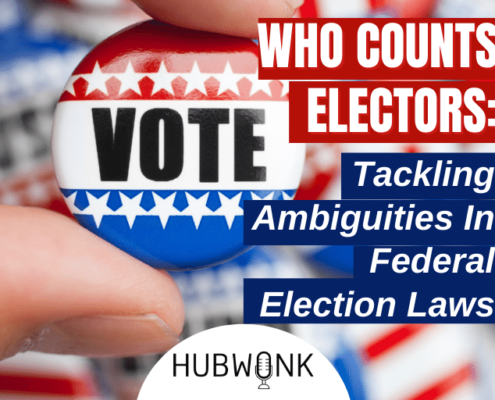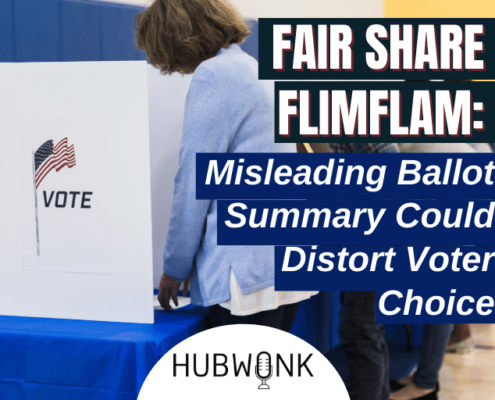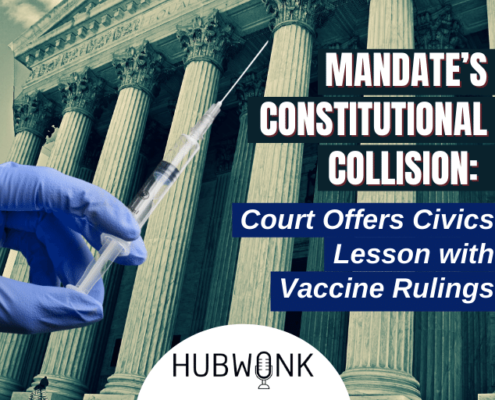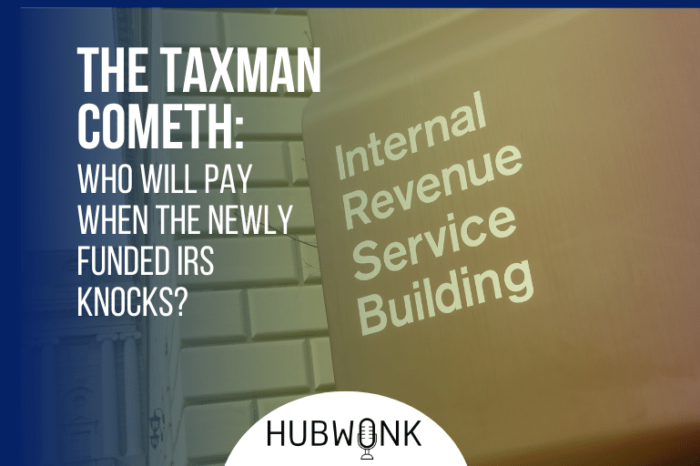The Taxman Cometh: Who Will Pay When the Newly Funded IRS Knocks?
/in Featured, Podcast Hubwonk /by Editorial Staff
This week on Hubwonk, host Joe Selvaggi talks with Heritage Foundation senior research fellow Rachel Greszler about the $80 billion investment in the Internal Revenue Service, focusing on the promise to limit enhanced enforcement to high earners and whether the IRS will likely need to expand its net.
Guest:
 Rachel Greszler is senior research fellow at the Heritage Foundation’s Grover M. Hermann Center for the Federal Budget, analyzing retirement and labor policies such as Social Security, disability insurance, pensions, and worker compensation. Ms. Greszler’s writing and research includes analysis of reforms to Social Security and its disability insurance program, with the goals of returning them to their original focus of poverty-prevention and reducing the government’s control over personal retirement savings. She also focuses on both public- and private-sector pensions, seeking reforms to prevent governments, employers, and unions from making underfunded promises, and offering solutions to minimize pension losses and prevent taxpayer bailouts where underfunded promises have already been made. Greszler also provides research and commentary on workplace issues including: federal employee compensation; women’s issues; and labor policies such as the minimum wage and paid family leave. Before joining Heritage in 2013, Greszler was a senior economist on the staff of the Joint Economic Committee of the Congress for seven years. She completed her graduate studies at Georgetown University, where she earned master’s degrees in both economics and public policy. She also holds a bachelor’s degree in economics from the University of Mary Washington.
Rachel Greszler is senior research fellow at the Heritage Foundation’s Grover M. Hermann Center for the Federal Budget, analyzing retirement and labor policies such as Social Security, disability insurance, pensions, and worker compensation. Ms. Greszler’s writing and research includes analysis of reforms to Social Security and its disability insurance program, with the goals of returning them to their original focus of poverty-prevention and reducing the government’s control over personal retirement savings. She also focuses on both public- and private-sector pensions, seeking reforms to prevent governments, employers, and unions from making underfunded promises, and offering solutions to minimize pension losses and prevent taxpayer bailouts where underfunded promises have already been made. Greszler also provides research and commentary on workplace issues including: federal employee compensation; women’s issues; and labor policies such as the minimum wage and paid family leave. Before joining Heritage in 2013, Greszler was a senior economist on the staff of the Joint Economic Committee of the Congress for seven years. She completed her graduate studies at Georgetown University, where she earned master’s degrees in both economics and public policy. She also holds a bachelor’s degree in economics from the University of Mary Washington.
Get new episodes of Hubwonk in your inbox!
WATCH:
Read a Transcript of This Episode
Please excuse typos.
Joe Selvaggi:
This is Hubwonk. I’m Joe Selvaggi
Joe Selvaggi:
Welcome to Hubwonk, a podcast of Pioneer Institute, a think tank in Boston. No one wants to be audited by the IRS. For this reason, perhaps the most controversial feature of the newly passed inflation reduction act is an 80 billion increase to the IRS’s budget. Over the next 10 years, the law’s advocate have assured concerned taxpayers that no one earning less than $400,000 per year will be affected with treasury secretary, Janet Yellen, making this direction in an open letter to IRS commissioner Charles Rettig. Yet the law itself sets aside $45 billion in additional funding or enforcement. A 70% increase to presumably target the 1.8% of American taxpayers who make more than $400,000 per year. Indeed, such a shift in focus toward auditing higher income filers comes in contrast to the IRS’s historical record of auditing those with income below $25,000 a year at a rate five time higher than everyone else bolstered by the popular narrative that wealthier taxpayers do not pay their fair share of taxes.
Joe Selvaggi:
The IRS has set the public’s expectation on finding an additional $200 billion in gross revenue from the ranks of higher earning Americans. Those with the accounting and legal expertise to properly file and defend the accuracy of their returns. Should Americans see this new funding as a much needed first step towards ensuring everyone, especially high earners pays the taxes they owe, or might the IRS use the 50% increase in funding to target far more numerous working class Americans on which it has historically focused. My guest today is Rachel Greszler senior research fellow at the Heritage Foundation where she studies the federal budget. Ms. Greszler has written extensively on the need for a tax code that is easier for Americans to understand and harder her filers to cheat. She’ll share with us an overview of the Iris’s budget and priorities, which filers have historically been targeted by its auditors and assessed the likelihood that the agency will find promised revenue from high earning taxpayers, those making more than $400,000 a year without needing to resort to auditing the other 98.2% of middle and lower income Americans. When I return, I’ll be joined by heritage foundation, senior research fellow, Rachel Greszler.
Joe Selvaggi:
Okay. We’re back. This is Hubwonk. I’m Joe Selvaggi and I’m now pleased to be joined by heritage foundation, senior research fellow, Rachel Greszler. Welcome to Hubwonk, Rachel. Thanks for having me, Joe. Great. Well we’re gonna be talking about the provisions in the newly passed Inflation Reduction Act. But before we do, I’d like to let our listeners knowyou’ve not been on Hubwonk before, a little bit about your background at Heritage. What do you study when you do your research there?
Rachel Greszler:
Well, I started out working on social security policy and a lot of retirement issues, but have kind of shifted over to doing a lot on labor policy. Recently, I’ve been following what’s happening in the labor market where all the workers and why haven’t they come back. But very broadly I’m looking at kind of public finance and all of the federal spending. And where is that money going?
Joe Selvaggi:
Okay. So you’re a budget expert. You, you look at what the government takes in and what, what it spends going out. We’re gonna focus on the coming in part today with the, with the IRS conversation. But before we talk about how much money comes in, how much does the federal government spend every year?
Rachel Greszler:
Well, if we’re talking about this year 2022, we are projected to spend $5.9 trillion. And I know that you kind of lose perspective. What’s a billion to trillion a million. Well, what that breaks down to is about $45,500 for every household in the us that the federal government is spending. And just a little perspective there that is more than double the amount that the federal government was spending in 2000, then it was about $17,000 per household. And even since just 2 20 19, you know, two, three years ago, we’re spending 32% more per household.
Joe Selvaggi:
So that’s a lot of money. I don’t wanna go down that rabbit hole. We can probably have a whole few podcasts on how much is spent, but let’s, let’s talk about how much it collects in taxes. So it, the, the, what goes out is 5.8 trillion. Mm-Hmm, <affirmative> what comes in revenue
Rachel Greszler:
In 2022, we’ll have about 4.8 trillion in revenue coming in. So again, household level, what’s that mean that’s $37,500 per household. And that’s also, you know, a big increase over recent years and definitely over those historical perspective.
Joe Selvaggi:
So it sort of challenges the narrative that nobody pays taxes anymore. We’re still paying more but we’re not keeping up with the out outlays. Just again for the benefit of our listeners there. My, if I’m keeping score we spend 5.8, we take in 4.8, that’s a trillion dollar shortfall. Where does that come from?
Rachel Greszler:
So that’s all deficit finance. We’re just adding to our debt that is growing day by day. And that’s a big gap. That’s about $8,000 per household. More that is being spent than is being taken in. So about 21%, if you’ve sat down at the kitchen table and done any budgeting, you know, that you can’t have a 21% deficit year after year for very long, and yet the us is continuing to do this
Joe Selvaggi:
Indeed. So we talk about the, the debt. But the deficit is a comp accumulation. Well, the, the overall debt is accumulation of all the deficits we’ve had in the past. So what we add ’em all up going back to the beginning mm-hmm <affirmative> how much does the federal government owe essentially how much more has it spent than it’s taken in?
Rachel Greszler:
Yeah. So if we look at the treasuries debt clock that you can see on their website that says we have $30.7 trillion in debt that’s about 230, $8,000 per household. Now a lot of that, we actually owe to ourselves, we’ve kind of made promises through things like our entitlement programs. The publicly held debt is a little different figure and that’s at about 23 trillion.
Joe Selvaggi:
Okay. All right. So we’re gonna talk about the revenue needed clearly there’s a short call. We’re not taking in enough revenue and presumably this, this money we’re gonna talk about funding for the IRS is to increase compliance, making sure everyone pays their fair share of taxes, the taxes they owe at least in some small part to address this towering deficit that we have each year. Right. So let’s, let’s start on a very high level. How much does the IRS estimate we should be paying versus how much do we do pay? How much does the, I estimate isn’t being paid by people let’s say evading taxes.
Rachel Greszler:
Yeah. And so they’ll refer to that as like the tax gap. How much more should we be collecting? Whether if it’s purposeful evasion of taxes or just not understanding it? We don’t have any recent figures from, you know, a couple years ago, but looking back at 2013, when they did put out a report, they estimated that the tax gap was about 381 billion. That was about 14% of the revenues they were collecting at that time. So if you multiply that by current revenues, right now, we’re looking at potentially as much as 800 billion that they might say is the tax gap.
Joe Selvaggi:
So we’ll talk, call that the addressable market to use an investment term, right? That’s the addressable market for trying to enforce and encourage everyone to pay their, their, their fair share of taxes. So let’s talk about this new inflation reduction act and what money goes to the IRS, how much new funding is going to the IRS in this new, new, long,
Rachel Greszler:
80 billion over 10 years.
Joe Selvaggi:
Okay. And do we know how that money’s gonna be dedicated? Is it 80 billion worth of auditors or, or are they buying on new cars for their employees <laugh>
Rachel Greszler:
Well, they’re gonna be doing a number of things. The biggest part will be new auditors. 57% of that new funding will go towards enforcement. So that will primarily be auditors. About 32% is gonna go for operations. That could also be included in that enforcement. It’s not clear 6% for upgraded systems, you know, modernizing the computers and 4% for taxpayer services. Okay. And just in total here, this is about a 70% increase in the enforcement funding for the IRS.
Joe Selvaggi:
So the line share of this 80 billion, and again, that’s spent over 10 years, but 80 billion will be for enforcement. That is to say cracking down on people who are not paying their fair share. How many auditors are there now and how many R estimated to be? You know, I’ve heard a lot of people that saying, don’t, don’t worry about these additional auditors. It’s just replacing those who are, are retiring. So is there any valid validity that are, are we getting more auditors or just younger ones?
Rachel Greszler:
Absolutely more auditors. I think that they’re about 11 to 12,000 tax auditors right now out of a total, total of 80,000 IRS employees. So it’s not the lion share of the current IRS employees, but out of the new funding that’s coming in, it is going to be the majority of that will be going towards these enforcement, the auditors the IRS projects that they would have about 87,000 new IRS agents. They don’t give us a breakdown on, you know, how many of those agents are gonna be enforcement versus other things, but just multiplying the 57% of the bill that’s going towards enforcement that suggests that you’ll have at least 50,000 more auditors.
Joe Selvaggi:
Okay. All right. And so again, this is even tougher number to tease out, and I know it it’s highly stratified, but what’s the audit rate now for an average American you could mm-hmm, <affirmative>, we could probably tease it out by low income, middle and high, but give us some broad numbers on how, how many people are audited now.
Rachel Greszler:
Yeah. Broadly it’s less than 2%, you know, it’s less than 4%, 0.4% for lower income individuals. And it’s up to about 4% for higher income individuals, but under 2% total.
Joe Selvaggi:
So with a relatively low audit rate if we increase that or double that, you know, whatever we do is that increase it by 70%, presumably we’re going to find undiscovered revenue. Is that right?
Rachel Greszler:
Yes. The IRS projects, they have estimates of how much new revenue will come in per each audit based on the income level that is given there. And so significant amounts of new money, they estimate will come in across all income levels if they do these new audits.
Joe Selvaggi:
Okay. Now our listeners and many people who heard about this new funding were sort of not particularly excited about the prospect of more being more likely to be audited. But I think to assuage the average voters concerns the sellers of this new law have assured Americans that those that this new enforcement would be only applied to those making $400,000 a year. And I really wanna focus in on this promise because very few people I think would support it if we knew everyone was twice as select we audited, but if we limit those to 400,000 a year or more let’s, let’s drill down on that. First of all, how much did the, does this did the new funding promise to generate? I, I think I heard a number like 200 billion. Is, is that what you had heard that that’s the goal?
Rachel Greszler:
Yep. Just over 200 billion. And I think on net about 125 billion when you account for the new cost.
Joe Selvaggi:
So we’re just gonna stipulate that the the sellers of this new law believe what they say. So two, $200 billion are gonna be taken from those or discovered from those making more than $400,000 a year. What percentage of, of buyers in, in the us make more than 400,000 a year?
Rachel Greszler:
Very few it’s only 2%.
Joe Selvaggi:
Okay. Yeah. I I’d read something one point percent. It’s it’s smaller number. Yeah. Less than two. Yeah. now there’s a difference between someone who makes more than $400,000 and someone who makes $40,000 in that I would imagine as, as income goes up. So does your likelihood of having a sophisticated tax preparer and a tax attorney to advise you on how to fill out your term? Not too many million dollar a year, people are using turbo tax online. They’re, they’re probably getting a little better council. Is there any sense of a relationship between income and let’s say compliance, I don’t know how to delicately say that. Do do wealthier people somehow try to cheat on taxes or, or just try more, more sophisticated ways of, of avoiding taxes.
Rachel Greszler:
Yeah. And it is difficult to break out what is, you know, trying to cheat versus being subject to a more difficult tax code. But we do know that the IRS reports out what percentage of the returns that they audit end up having the individual, not owe any more money saying, Hey, they did it right. The first time they owe nothing. And actually the wealthier taxpayers are more likely to have paid it right the first time. And that’s because they have the money to hire the lawyers and the accountants to make sure that they’re doing what they’re supposed to. A higher percentage of the lower income earners tend to have paid the wrong amount and to owe something.
Joe Selvaggi:
So I, I won’t say entirely dispel submit, but the wealthy, you know, cheat on their taxes, but empirically, it seems that they’re more accurate in their returns and say lower income people and perhaps the lower income people make mistakes. Because again, they don’t have the, the advice and professionals not because they’re less honest, it’s just, they just make mistakes. Right? Yeah. Okay. Now let’s take it back a notch. We, we have an I IRS investing, new agent, investing new agents and systems, you know, with the goal of recovering money, $200 billion, we said and they’ve historically invested that those resources across a broad range of incomes. Now given that it’s 1.8 or 2% of, of earners, and you’ve already asserted that those people’s returns are more likely to be accurate than the average returns. Is it realistic to think this 80 billion investment in, in enforcement when applied to only 1.8% of income filers is going to be successful in generating the revenue that’s promised? And my following question, if you could anticipate it is when it doesn’t, if it doesn’t what will, but next, so let’s start with Uhhuh. You know, you study this all the time, given such a narrow segment of the population, ha having 80 billion can, you know, aimed at its chest. What is the likelihood that they’re gonna find what they’re looking for?
Rachel Greszler:
Yeah. It seems very difficult for the math to add up here and you can look at all, the statistics are available. How many taxpayers are here? What are their tax bills? What is the IRS estimate they’ll get from each new audit? You know, and so I did play around with the math there, and it just seems nearly impossible to generate all those new revenues or to even utilize all the new agents, if you’re going to limit it to those that are making under 400,000 you know, some of the scenarios I played there was, well, what if we even go back to the 2010 audit rates? And those were significantly higher. They’ve said, you know, that they’re not gonna go back necessarily more than a few years, but what if we went back to 2010 and everybody that was making over $400,000 we’re gonna impose those audit rates.
Rachel Greszler:
That’s only gonna generate 28% of the new revenue that they have estimated will come there. And so how much higher would those audit rates need to go? Well, I got to a 30 fold increase, multiplying the current rates by 30 you know, for people making over $400,000. And that would mean a hundred percent audit rate on taxpayers with income over 10 million. And that would still be 20% short of the estimated new revenues that you’re looking at. And then looking in other ways, I considered like how many hours does the IRS say that each agent needs to spend per tax return? And even auditing every single taxpayer that had income over a million dollars would only require about 25,000 new IRS agents. But here we know that a total of 87,000 will be hired and probably about 50,000 of them will be for enforcement.
Rachel Greszler:
So it just doesn’t seem to add up that you could logically limit it to people making over $400,000. And in the end, I don’t think that’s their intent either because you think of like the low hanging fruit on a tree. A lot of that is the lower income taxpayers. And even in IRS, you know, government accountability office report from them said that they, the majority of the additional taxes that the IRS recommends to come from audits is from taxpayers with income below $200,000. So if that’s their own recommendation, is that more than 50% of the new revenues we wanna gain our people below 200,000, it seems illogical that they’re really going to limit it to those making over 400,000.
Joe Selvaggi:
So if I’m the head of the IRS and I have promised the I guess secretary yelling that we’re gonna find 200 billion from American taxpayers I’ve got two paths or at least two paths I can go, I can go down this path where I target the 1.8% making $400,000 who arguably have more compliance and less lower income people and more sophisticated attorneys and accountants. And perhaps I would need more sophisticated auditors to to untangle their returns and, and then fight them in court to to to retrieve that revenue that’s door, number one very expensive and perhaps less revenue there. Door number two is people below 400,000 indeed. You said people below 200,000 where far more mistakes are happening. Those people are far more numerous it’s 98.2% of the country, right? That’s a lot of people and you’re going to find the money there. Ultimately the IRS is gonna be accountable for the money they either take in, or don’t take take in. Is it your argument that it’s far more likely the Iris will let’s say not keep its promise to look only at people above 400,000 and revert to its natural target of, of good old middle America hardworking middle class person.
Rachel Greszler:
Yes. I think if they’re gonna be held to actually bringing in this new revenue and actually having the agents that they hired, do the jobs that they were hired for, then they’re gonna have to start increasing audits on individuals making under $400,000. Their own reports show that that’s where the bang for the buck is. I mean, you can see individuals making under $25,000 a year and audit takes one to two hours, and it generates an additional $5,000 in revenue. I mean, if you want to increase the revenues that aren’t being paid, that the tax system says are owed, that is where the majority of the money is. And I think that they’re going to have to start going after that, unless they just throw their hands up and say, we have all this new money. We have all these new agents and we’re not doing anything productive with them.
Joe Selvaggi:
Does your research account for how much time is spent by Americans filling out their tax returns? And I, I ask this for this reason. One is if we know auditing and, and enforcement is doubled, or actually the funding is increased by 70% I, I assume a secondary effect will be more Americans will spend more time with their taxes, right? They’ll, they’ll make sure they dotted their eyes and cross their Ts. How much time do do Americans spend doing taxes and have you done any work on how estimating the value of that time? Mm-Hmm
Rachel Greszler:
<Affirmative> I have not done that. I’ve seen some great estimates out there that liken it to, you know, how many hours of your work day. And I think it’s, you know, up to 10% of, of productive work year can be spent filling out these taxes. And we can expect that everybody across the board is going to need to make sure now that they are doing everything, they’re saving all these receipts. They’re keeping track of it. They’re filing if they need to, if they’re self-employed or if they work independently, even in like a gig type job that they’re filling out with the appropriate tax agencies. And so it’s gonna be a lot more hours spent with the compliance, but then it also gets to the fact that you don’t continue to have the tax revenues grow over time. Because once you get to a certain audit rate, people just do what they need to to make sure that they’re paying what they’re supposed to. And then those additional audits are actually not generating any new revenue because everybody just knows my likelihood of being audited as high. I’ve gotta make sure it’s right the first time.
Joe Selvaggi:
Indeed. Indeed. All right. Well, you’ve written, I love what you’ve written about. The tax code. I I’m gonna paraphrase you. I think you wanna make it easier to file and harder to cheat. Is that a fair characterization of your work?
Rachel Greszler:
Yes, absolutely. You know, the mere fact that so much additional revenue can be brought in by individuals making less than $200,000 a year. And especially those making less than $25,000 a year, that every one of them is, you know, $5,000 in new revenue can come from auditing them. That says that our tax code is far too complex. Even at across all levels, but corporations are filing 6,000 pages of tax returns. I mean, that should never be the case. We need a far simpler system so that it is easy to know how much you owe to pay what you owe and that it’s more difficult to cheat. And so we’ve got to get to a cleaner slate, you know, have a broad base tax that doesn’t have all these car valves and loopholes, and oh, if you do this, we’ll give you a tax rate and this and that, but just lower rates, broader base so that everybody knows I’m gonna pay this flat rate or whatever it is, you know, on the income I earned and that it could be filed in a simple postcard that you would never need to worry about an audit coming after you.
Joe Selvaggi:
It seems interesting that again, looking at the entirety of the inflation reduction act along with better enforcement of the tax food by the IRS, there’s all these car outs tax benefits for those people who are invested in clean energy, these sort of things manufacturing, chips, and these kind of thing. And it seems to be ironic that the people who are insured that the, the rich don’t pay their taxes are the ones who are applauding the fact that the rich are being given tax benefits before they’re green. It just seems to me like I can, if we go forward in a time machine, we can imagine someone building a green company paying no taxes because of this bill a year from now the same people said, know, corporations, aren’t paying their fair share of saying that company isn’t paying any taxes this year. Do, do you see an ironic contrast there?
Rachel Greszler:
Absolutely. I mean, you’ve hit the nail on the head here that we somehow demonized higher income people. And at the same time are creating systems to do loopholes for them. You know, the average American can’t afford to buy an electric vehicle. And yeah, we’re creating tax credits for those who are wealthy enough to be able to afford them. And one week Congress passes this chip spill. That’s gonna send tens if not hundreds of billions, of dollars to corporations that tend to be wealthy corporations. And then a couple weeks later, they pass a bill. That’s gonna increase taxes on some of those exact same companies that they’re giving the handouts to. And it just gets into why are we trying to micromanage the economy here into the tune of benefiting in most cases, the wealthy people that you’re on the other hand, trying to go after and crack down on.
Joe Selvaggi:
So I’d like to sort of get, we’re getting closer the end of our time together, but I like to sort of frame a question sort of the king for a day kind of or queen for, for a lifetime. If you were in charge of the tax code, I think you’ve already sort of shown your cards. You’d like it to be far more simple. What would you do what would you have done in, in this particular bill to have perhaps encouraged compliance that no, nobody here as wants people to cheat on their taxes, encourage compliance but do it in a way that isn’t nearly as painful as increasing enforcement by 70% over the next 10 years, what would you do?
Rachel Greszler:
Well, I don’t know that it could have been done in a bill like this, but I would do a complete overhaul of the tax system. I would get down to one low rate a certain exemption, so that lower income people aren’t paying any taxes up to a certain point, but that flat one low rate get rid of all of the deductions and the loopholes and everything else that is out there and make it simpler to pay what you owe more difficult to cheat. When you have that one rate and it’s very clear how much income is coming in, it’s more difficult to cheat. And that really would free things up for the economy to grow more because we’re not taking money from productive resources and putting them to unproductive ones. And it ends up having higher incomes for everybody and just the simplicity of it and all those lost hours that are spent right now complying with the tax code and also getting at only tax income. Once you should pay taxes on your earnings one time when you earn them and not ever have to worry about paying them again and paying them at a different rate. So more simplicity is the biggest thing that we need.
Joe Selvaggi:
Indeed. I think, you know, those of us who do like a, a simpler tax code or even a, a flatter tax code are often characterized as being UN unsympathetic to lower income people. But as you pointed out, it’s the lower income people who are making honest mistakes on their returns and ultimately getting swept up in these audits. So that simpler tax, I like to say complexity is a subsidy for, for the wealthy, right? The, the crazier, the tax code becomes the more the wealthy can, can do it, right. And the, the more perplexed, lower income people are, and more likely they are to be caught by an audit which can, you know, really disrupt their lives. Do you see it the same way?
Rachel Greszler:
Yes, absolutely. And that’s what all the evidence shows is that we are disproportionately hurting the lower income people. They just wanna go on with their lives, work a job, earn an income, take care of their families and not have to worry about am I doing everything right? And we’re getting to the point with some of the new rules that have been put in place that we have to worry about. Even the payments we might make to a friend for rent is that gonna show up in a Venmo transaction, that then the IRS is gonna trigger an audit on me. And if I didn’t save my receipt from going to the doctor the other day, or paying for a prescription, they’re gonna say that I owed more money. You know, oftentimes it looks like you owe more, but it might just have been a mistake or you can’t prove you don’t have that receipt or something available to prove that you paid what you owed.
Rachel Greszler:
And I just wanted to add too, that, you know, kind of the irony here is that the federal government is cracking down on individuals who aren’t paying the government, the amount that they say that they are owed, but then the government’s taking that money. Most of what the government does is simply tax and transfer that money to somebody else. Two out of every $3 that is collected in taxes is simply taking money and transferring it somewhere else. And in the process, they’re doing a really poor job at that. You know, they say the tax gap, well, there’s a huge payment gap too. Just last year, the federal government spent 281 billion making payments in the wrong amount to the wrong people. And so if they’re gonna crack down on everyone else and say, you’ve gotta pay us the right amount, then they should move forward and they should be paying the right amount, at least according to their own laws
Joe Selvaggi:
Indeed. And I think that’s a great point as long as we’re piling on. I just will, will say it is odd to me that you know, in a case of an audit, unlike, let’s say in a case of criminal law where you’re presumed to be innocent in, in other words, the, the, the government has a burden of proof is that you did this thing, this wrong thing. And we need to prove beyond an an element of doubt in an audit it’s presumed, you’ve, you’ve cheated on your taxes and you have to prove you did this. It just seems like I mean, I know we need tax enforcement, but it just seems an odd relationship with the government when you walk in there and you have to say, yeah I paid every cent I owed.
Rachel Greszler:
Yeah. That’s an interesting way to look at it. And I like that. Cause you think of the taxpayers having to come in with their briefcase of all their paperwork and the auditor’s just sitting there empty handed. Hey, prove to me that you did what you should have when it should be other way around saying like, Hey, it looks like you did something wrong. Right. Can you prove that you didn’t?
Joe Selvaggi:
No, it’s, you know, there’s no presumption, but we would all object if the IRS audited every 10th house on the block. But we, we don’t seem to scrutinize it’s methodology when it’s even more opaque than something like that. Soanyway, we’ve gone off on a tangent here. I’m reallythrilled that you joined us today on Hubwonk, or you’re a font of information. I hope you keep your eye on, on the IRS and see if indeed as we predict or if they’re sticking to their $400,000 and above promise, or as we predict they start to wander into the ranks of us mere mortal who are, as you say, just trying to get by and make a living.
Rachel Greszler:
Yep. It was my pleasure to be with you,
Joe Selvaggi:
Joe. Thank you, Rachel. Bye-Bye
Joe Selvaggi:
This has been another episode of Hubwonk, a podcast of Pioneer Institute. If you enjoy today’s episode, there are several ways to support the show. It would be easier for you and better for us. If you subscribe to Hubwonk on your iTunes podcaster, it would make it easier for others to find Hubwonk. If you offer a five-star rating or a favorable review, we’re always grateful. If you want to share Hubwonk with friends. If you have ideas or suggestions or comments for me about future episodes, you’re welcome to email me at hubwonk@pioneerinstitute.org. Please join me next week for a new episode of Hubwonk.
Recent Episodes

Ich Bin Ukrainer: European Nation Existential Fight Against Aggression

Successful Aging Support: Reimagining Effective and Affordable Long-Term Care Solutions

Pandemic Dead Reckoning: Unseen Casualties of Public Health Interventions

Olympic-Scale Doctor Shortage: Tapping International Talent

Transit Innovation Explored: A Bus As Fast As A Train?

Who Counts Electors: Tackling Ambiguities In Federal Election Laws

Fair Share Flimflam: Misleading Ballot Summary Could Distort Voter Choice




